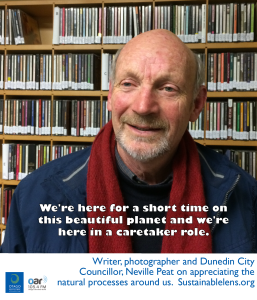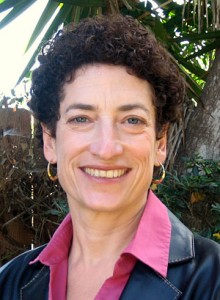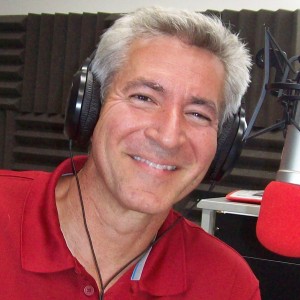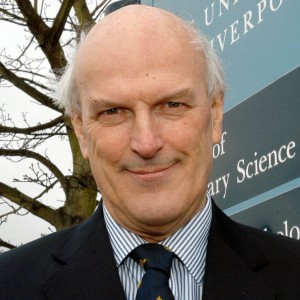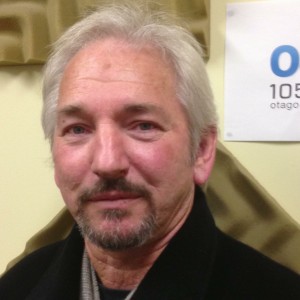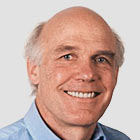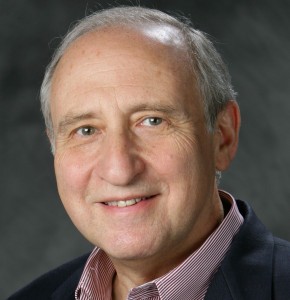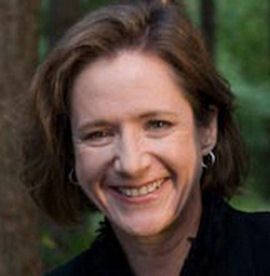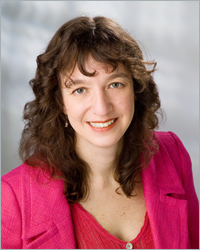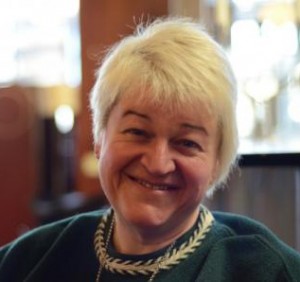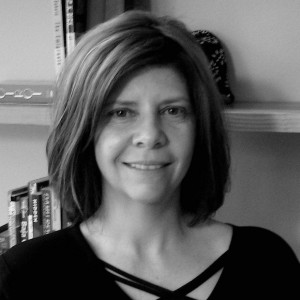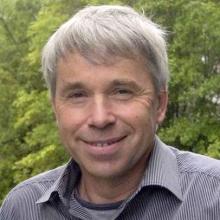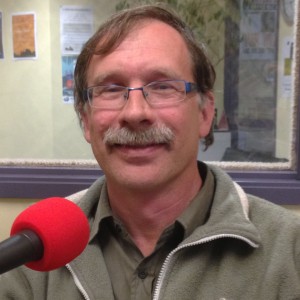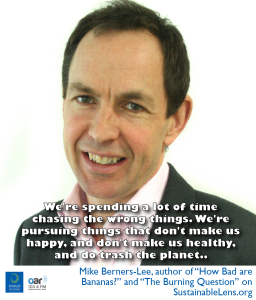
We’re spending a lot of time chasing the wrong things. We’re pursuing things that don’t make us happy, and don’t make us healthy, and do trash the planet.
Mike Berners-Lee of Small World Consulting is an expert in greenhouse gas footprinting and organisation development. He is the author of How Bad Are Bananas?:The carbon footprint of everything, and with Duncan Clark is co-author of The Burning Question.
Talking points
Trying to give us an instinct of where the climate change impacts are in everything.
None of us are born with that instinct, this sense of the climate change impacts…this invisible gas carbon dioxide and all the other greenhouse gases, and the emissions take place, not in front of our eyes where we can see, but the emissions take place down long distance supply chains that most of the time most of us haven’t got a clue about.
I ended up doing a physics degree…but it bored me rigid, I couldn’t really give a monkeys whether the Higgs boson exists, but I’m much more interested in questions about how we live and how to better peoples’ lives and how we build a global society.
I got a job as an outward bound instructor, and that was all about people and how they live together and how we make the most of our lives – how we think about about how we want to spend our time.
I saw that by and large, environmental consultants didn’t have the ability to bring about change…they could comment, but they didn’t seem able to make the business world or the political world do what the evidence was suggesting would be a good idea.
With climate change increasingly clear as a big deal, I thought perhaps I’d better have a go at seeing what I could do, so I formed an environmental consultancy focussed on climate change.
There’s a breakdown…there hasn’t been enough understanding of all the different perspectives that need taking into account if you’re trying to create change.
If you look at the world getting on top of sustainability issues you need much more systemic thinking – who are all the stakeholders in the world? And what really are their world views, and what can they and can’t they respond to in order to create a realistic model for change.
Small World – it is an increasingly small world. Everything that Small World does is in response to the fact that it’s an increasingly small world in relation to the power of our species.
If you look at the way that we traditionally operate as a species, we can understand the impacts that occur in front of our eyes – we’re quite good at living in small communities, no one in this room is likely to hit anyone in the next few minutes, we’d all be shocked by that because we would have seen it and understand it, but we’d be much more likely to do something that has a much more indirect and diffuse negative impact – we’re much more likely to do something that triggers a carbon footprint, which causes a diffuse negative impact on seven billion people spread over the next decades.
We’ll probably never understand what we need to become much better at tuning into that kind of abstract impact.
You can get bogged down in defining sustainability. I think we can all agree that it is about living well in a way that enables others to live well now and in the future.
Over-consumption is a part of the problem. The reason we’re doing it is we think it will enable us to live well, but it doesn’t enable us to live well.
We’re spending a lot of time chasing the wrong things. We’re pursuing things that don’t make us happy, and don’t make us healthy, and do trash the planet.
Lots of us are working harder than we need to, buying things not because of their intrinsic enjoyment but because we’re subconsciously hoping they’ll give us some sort of surrogate measure of our human worth – and of course that’s completely spurious.
It’s deeply embedded and I’m not going to pretend I’m free from this either…we’re all susceptible, we all get trapped into cultural influences.
I thought I’d outsource the number crunching and I’d do organisational change, but I couldn’t find anyone doing a practical but robust job of supplying good enough management information about the real full carbon impacts of everything we do.
You can do a process based supply chain analysis: map out all the stages back to theoretical limits, but this hugely underestimates the impacts. There are infinite pathways of infinitely long supply chains – even if you do the major ones and cover all suppliers suppliers suppliers you have billions of pathways and might only have half the impact.
In some industries there is a massive underestimation…telecoms 80% underestimated, construction something like 50%
Input/output analysis…maps out the economy by industries and attributes emissions to industries then maps out the flows between industries in economic terms…the result is capable of tracking supply chains, with some major assumptions, but it doesn’t systematically underestimate.
The best route to a credible answer is a combination of methods.
The IT industry…data centres are about half a percent of the global emissions and rising fast, a pretty big deal if you think that paper has only ever been about 1%
So is digital a route to saving carbon? If we stored the same amount of information as we once stored in filing cabinets, then it would be, be the reality is that because it is millions of times more efficient, we stored millions of millions of times more information – and not only that, we’ve still got the filing cabinets as well.
This is a classic example of a really important effect – the efficiency improvements that we assume are going to bring about less drain on resources and less environmental burden, end up increasing environmental impact. Counter intuitive, but critical for us to get our heads around.
If you track greenhouse gas emissions from 1850 you get a mathematically exponential 1.8% increase per year…some tiny variation, but exponential growth, resilient, impervious to change – short term dents around wars and so on, but the curve bounces back.
What’s going on? Surely we should be seeing some dent on the curve. Efficiency gains by default don’t bring about a reduction in total burden.
This astonishingly simple reality has passed by policy makers and politicians the world over. That’s why we wrote the Burning Question.
This astonishingly simple, uncontestable science which was so so important you couldn’t hope to get on top of climate change without integrating it properly and hard into the psyche and thinking of anyone making decisions under this agenda.
If climate change was just a bit of science and politics and technology then we would have sorted it out by now. Our species is good at solving this kind of problem, but climate change isn’t one of those problems.
Climate change is the most fascinating, as well as most pressing puzzle humans have ever had to deal with. In addition to the science and politics and technology, it involves psychology, sociology, culture…probably inescapably about art as well.
How do human beings function as a seven billion unit on a small planet?
It doesn’t work to try and solve the problem in silos.
You would think the bulletproof scientific case would translate in a problem we were taking seriously
We’re good at facing up to some pressing problems, if I were to punch you on the nose everyone in this room would wake up to a problem and we’d all start dealing with it. But climate change is abstract. It’s about an invisible gas. There’s a whole lot of difficult science you need to get on top of in order to understand what is going on, there’s uncertainty, and uncertainty makes us uncomfortable, it’s a problem about the future (increasingly about now, but primarily about the future), so we have to start tuning into what’s going to be happening in 40 years time, thinking about our kids in ways that we’re not used to – so far into the future. Somehow we have to tune into people on the other side of the world who won’t ever know that you or I exist in person, and we’re never going to meet, we’re never going to know them, and we’re going to have to start caring about them in the same way that we care about our own families and our own street.
All of those elements have completely caught us off balance. Our normal ways – of doing science, communicating science, and doing politics and economics – has be proven unfit for purpose: shown to be lacking in helping us get on top of the climate change problem.
There’s a disconnect between science and politics
How we dealt with ozone was encouraging in that it showed we can respond internationally. But dealing with the ozone problem didn’t need a fundamental reworking of so much of our economic fabric.
A carbon constrained world is an enormous opportunity to huge chunks of the business world – any industry in the business of providing efficient utility should be seeing carbon constraint as a massive opportunity.
One of the great questions is to what extent is the current economic model broken and unfit for purpose? Most people jerk to one end of the spectrum. At one end – “the way we do economics has to be taken as a given , and you can’t change that, we have to have economic growth in the way that we’ve always understood it”. And at the other end there are people who think that “all of that has been the root of all evil anyway, and we need to get away from it and climate change just gives us one more reason why we should”. This needs to be a much more balanced discussion.
This is clear. Although we’ve never managed to achieve economic growth without increasing our environmental burden in the past, it is unproven that we couldn’t do that.
We have absolutely got to have a global cap on carbon coming out of the ground.
Science tells us we need to cap the total amount of carbon ever coming out of the ground, and we’re not far from that – it could be a couple of decades on our current trajectory. Because of lags and that exponential curve…if we go past two degrees and stay on trajectory, we’ll very rapidly go past 2,3,4,5,6…
We absolutely, urgently need a cap on the carbon that ever comes out of the ground.
We can burn something like half the proven reserves, if you look at the the total amount in the ground, we can only ever burn a minuscule proportion of it.
There’s no chance that fuel scarcity will get us out of this – there’s just too much of it. As a species we’re going to to have to commit to leaving it in the ground.
If you are a fuel company and your business strategy is to sell fossil fuel, then your position is similar to being a tobacco company – trying to get people to smoke as many cigarettes as possible and your only route is to try to dodge the legislation, delay the legislation, pull the wool over as many peoples’ eyes for as long as you can – that’s the kind of business you’re going to have to be.
If you are in the business of providing utility for households, for example, so that people can be warm and comfortable – that’s a different proposition. That allows you to move away from fossil fuels, it allows you to encourage people to be efficient in households, it allows you to invest hard in other energy sources, and it gives you a pathway (at least in theory, there’s detail to work through), to be a thriving business contributing to a sustainable world.
A global carbon constraint would change the value of all kinds of product and services.
If you were in the business of enabling people to have more utility through less use of resources, then you would be a pig in shit. And that case is just starting to be grasped by large organisations.
The psychology of human denial is quite fascinating…difficult news, dealing with grief…the same applies to climate change…the difficulty is the are so many new ways in which we can put off the bad news.
If your loved one dies, there’s a hard reality, your brain can’t wriggle out of it. Climate change isn’t like that, there’s a lot more wriggle room – it’s abstract, it’s going to be going on for a few years, it doesn’t start next Tuesday,…and there’s lobby funding to create a whole storyline to help persuade you that you can put this off for another day.
Even if you accept the facts, you’ve still got a whole bag of excuses why there’s nothing htat you can can do – it’s not my problem, it’s somebody else’s, it’s really down to the politicians, businesses, consumers or maybe it’s down to people in other countries…everybody’s got a reason why it’s not them that has to be them that has to do anything about it.
We’ve got layers and layers of defenses between the evidence and the hard reality that all of us have an important and urgent role in confronting the issue right now and we can all do something about it.
The business opportunity shouldn’t be the root reason why businesses should change what they do. We should be clear and unembarrassed about this – the reason why we as people, individuals, businesses, and as countries should respond to climate change and sustainability is because it is the right thing to do. Fullstop. We shouldn’t be embarrassed about that.
Whether or not it is the most profitable thing to do, we should do it because it is the right thing, because we care about our kids, and they’ll look us in the eye and ask what we did about it.
People will look back and think “what were they thinking?” and they’ll have every right to.
They’ll look back and say “what were you doing?”.
They’ll wonder how we got swept along, they’ll wonder at our inaction and they’ll be disappointed by it, and we won’t like that feeling.
We won’t like this question “when you saw climate change fully in the face, what did you do about it? Did you really just carry on? Because you couldn’t think of anything to do or weren’t you brave enough because everyone around you was just carrying on? Were you really that weak?” I think we would all be embarrassed to think of ourselves like that.
(Activist?) I roll my sleeves up in some ways. I try to target my efforts, I could always do more.
You have to find a way of responding properly to this agenda in a way that also that works personally, and that is difficult. The person that works out the answer to this will be so infectious that our species will get it.
Young people are getting it, they’re on the case.
(Motivations) Anyone who pauses to think about it wants to be constructive in their life.
I tend to see the bigger picture better than I see little details. Once you see the bigger picture, it’s pretty hard to ignore sustainability as a big deal.
(Challenges) The Burning Question remains, if you have a clear understanding of uncontestable important realities (that we need to urgently cap fuel coming out of the ground, efficiency on it’s own won’t help us, and renewables on their own won’t help), then the biggest crunch is the gap between the evidence base and the action.
It’s all too easy to collude in just being part of the problem, doing things that look like they’re great but if you look at what is their contribution to creating the conditions, we find it doesn’t really make a perceptible contribution.
What can any of us do to be meaningfully part of creating the conditions under which the world leaves its fuel in the ground?
All the little things add up if they create meaningful cultural change.
It is possible to get quite bogged down and depressed about the state we’re in, the scale of change we need and that we need it pretty fast. I could also get quite optimistic, because the way that things can change is by systemic tipping point.
The conditions will suddenly become more right. A blend of politics, culture, science and technology…all the pieces of the pie will come together in one go and we’ll realise that we don’t have to be trapped in this exponential trajectory – we can do something different.
Those conditions will have come about by all sorts of small things that look as though they’re nothing, beating heads against the wall, all looking as if pinpoints in this economic global dynamic, that’s taking us down the long road, but they’ll all add up together, and suddenly it’ll feel like things are beginning to move a little bit.
Unfortunately we can’t really set goals on getting to tipping points, spurious really, it’s too complex, and we don’t know what we don’t know, but we are gathering momentum
(Miracle) That we create conditions for world leaders to go to the Paris 2015 climate summit knowing that their careers depended on getting progress that is commensurate with the scientific evidence.
(Advice) Think out of the box. Think really differently about how you live, what makes you happy. Go back to first principles and think about it. Break out of and challenge all the constraints about how we have to do life.
We can have tonnes more fun that we’re currently having, by being more sustainable.
This is not a doom and gloom agenda, sustainability is a let’s have a party agenda.
